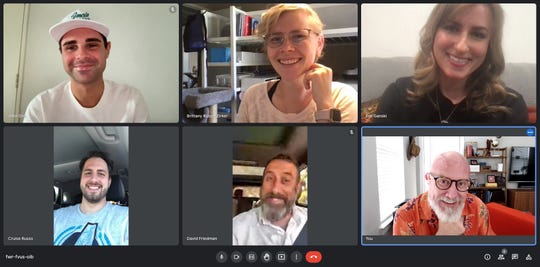
Will virtual onboarding for new workers be the norm post-pandemic? Some experts think so
Just moments into a three-day virtual employee onboarding process in March, Marcus Nelson began thinking about what modifications he’d make as several ideas flooded his head.
“I was already thinking about how I can change this process for other new employees,” said Nelson, marketing head for Xos Trucks, a Los Angeles-based startup that makes electric trucks for the likes of UPS and Loomis Security. “How can we take this onboarding from clunky and crappy to less strenuous and much easier?”
Three months later, Nelson, who works remotely in a suburb outside of Nashville, Tennessee, introduced an overhauled virtual onboarding for a new marketing coordinator joining his team.
Instead of three days, Nelson condensed the virtual onboarding into a two-hour onscreen meeting with company leaders and shared documents about marketing and branding, competitors and how to access key company data.
“It was a ramp-up made specifically for him. We made it shorter, more concise and very team-oriented,” Nelson said. “We didn’t expect him to absorb everything in one day, but we showed him in real time what his role is and who he can go to for help.”
Typically, onboarding, also known by some as orientation, is an in-person process helping new employees understand their position and learning company policies. It ranges from receiving training and meeting colleagues to filling out paperwork. The timetable for onboarding can vary by the company as the process can take several days, weeks or even months.
A team of managers at Xos Trucks meets with its new marketing coordinator during a recent virtual onboarding. Experts say virtual onboarding is likely to stay post-pandemic. (Photo: Xos Trucks)
But many executives and employment experts believe that virtual onboarding will remain post-pandemic. Why? Because traditional methods apparently haven’t been working well for new hires even before COVID-19 forced many to work remotely and online, according to a 2020 Gartner recruiter survey.
Only 44% of recruiting staff say their organization’s onboarding process effectively integrated new hiresinto the company culture, the survey said. That statistic is backed by employees as another Gartner survey conducted last year showed only 32% of those hired in the previous 12 months felt a sense of belonging to their organization.
“Organizations need to be a lot more intentional as they rethink the structure of onboarding,” said Lauren Smith, vice president at Gartner research. “New hires don’t expect everything to be perfect on day one, but managers need to be authentic during this important moment of transition.”
Here are some tips on ways to make a virtual onboarding experience more effective.
Virtual quirks and perks
As more offices are reopening with more Americans getting COVID-19 vaccines, for many companies, the option to work from home is here to stay. And that means new hires will most likely need to learn the quirks and perks of their new jobs – virtually.
“Most companies are exploring hybrid models where some people work at least part time from home,” says Andy Challenger, senior vice president of the outplacement and business and executive coaching firm Challenger, Gray & Christmas. “So virtual onboarding is almost certainly going to continue.”
Successful onboarding is key to retaining new staffers and helping them hit the ground running, several experts say. But schooling new staffers on a company’s culture, systems and the specifics of their particular role can be difficult when managers and colleagues are unable to interact in person.
That’s where communication becomes key, said Jaime Moran, chief product officer with Sana, an Austin, Texas-based startup that helps provide health insurance benefits to small businesses. Moran, who started at Sana in April and works remotely in Chicago, described her virtual onboarding process as “seamless,” which had fewer meetings and more interaction with colleagues who she has still never met in person.
“It’s a different experience as I’m very surprised how energized I feel being a part of the community and culture so quickly. I wouldn’t have expected it,” said Moran who is currently overseeing the virtual onboarding of her three new hires over the next 90 days.
She credits products like Loom, a platform popular with hybrid workers, to send quick video-recorded messages, and screen share instead of an email or a phone chat to explain tools and demos that are used with her staff.
The “onboarding experience, in general, is about building relationships with people who are going to be key to your success in the company,” Challenger said, “And it’s markedly harder to do that via Zoom.”
True to a degree, said Daniel Chait, the CEO and co-founder of Greenhouse, the hiring software company. He believes one in five hires will leave in 45 days if they have a bad onboarding experience and that organizations have a very short amount of time to make a strong impression.
“The question they have to ask is what are yougoing to do to make them stay?” Chait said. “If you haven’t impressed them with the possibilities for career opportunities and growth, as well as a sense that they belong, they can easily go elsewhere as an onboarding experience that lives up to that promise is essential.”
Yes, the internet fails: Outages like Fastly’s will happen. Here’s how to protect yourself
Apple iOS 15: FaceTime coming to Android and Windows, Notifications get smarter and everything gets more shareable
Make sure it’s not all about business
In that first meeting, give a new hire an overview of the business, as managers should carve out some time, perhaps 10-15 minutes just to get to know each other. “Make that specifically a part of the work because that’s the piece that gets so lost in a virtual setting,” Challenger said.
Nelson of Xos Trucksfelt by adding manager group meeting to the virtual onboarding process for his new marketing coordinator, it helped streamline the introductions.
“By refining it, being deliberate and customizing the onboarding (experience, it) creates a whole new level of team building, not that kind of classroom experience where you take notes and try to remember everything,” Nelson said.
As for Xos’ new marketing coordinator, John Dire, said he enjoyed the quick pace and thought his virtual onboarding went better than expected. Dire, 26, who’s starting his third job, said he’s gone through onboarding that’s taken up to two weeks. He appreciated that before his orientation with Xos, he received an email that answered most of his questions.
“I definitely enjoyed how fast everything went as I don’t have to wonder what’s next. I can look at what needs to be done, do it myself, and I know who to ask if I have any questions,” said Dire, who’s based in L.A. “I honestly feel a lot better, I have a better idea of what we’re working on.”
Dire’s supervisor, Nelson, said he plans to keep tweaking his onboarding “experiment” with the hopes other departments at Xos Trucks adopt a similar plan.
“I would love to tell them how we did it,” Nelson said. “I would love to evangelize this across the company.”
Onboard early, send equipment before the first day
Organizations should consider giving new hires their equipment long before they start work so they’re ready to go, says Matt Martin, CEO of Clockwise, the maker of a smart calendar assistant that helps employees with scheduling time.
Also, if possible, organizations should provide new hires with preboarding opportunities before they officially start their jobs, experts say. Chait, Greenhouse’s CEO, mentions in his book with Greenhouse co-founder and president Jon Stross, “Talent Makers: How the Best Organizations Win Through Structured and Inclusive Hiring,” they strongly encourage early onboarding prior to that start date.
“What can get done before the start day and not after? It may be that two weeks before that day, IT needs to contact the person with a welcome email, explaining what sort of systems they’ll be tied into, and asking for certain information, so systems are up and running on day one,” the execs wrote. “Then one week before start day, the hiring manager might write to voice enthusiasm once more at the person’s joining the team.”
Chait and Stross also wrote the goal isn’t “to load up the new employee with tasks or any sense of pressure,” but to reinforce that the hire is valued.
Gretchen Alarcon, vice president and general manager of HR Service Delivery business unit at ServiceNow, said she was able to get several tasks done with early onboarding in her current role after leaving Oracle last year.
“That preboarding content where I could see the process I was going through made me feel more confident going into my new job,” Alarcon said.
Source: Read Full Article
